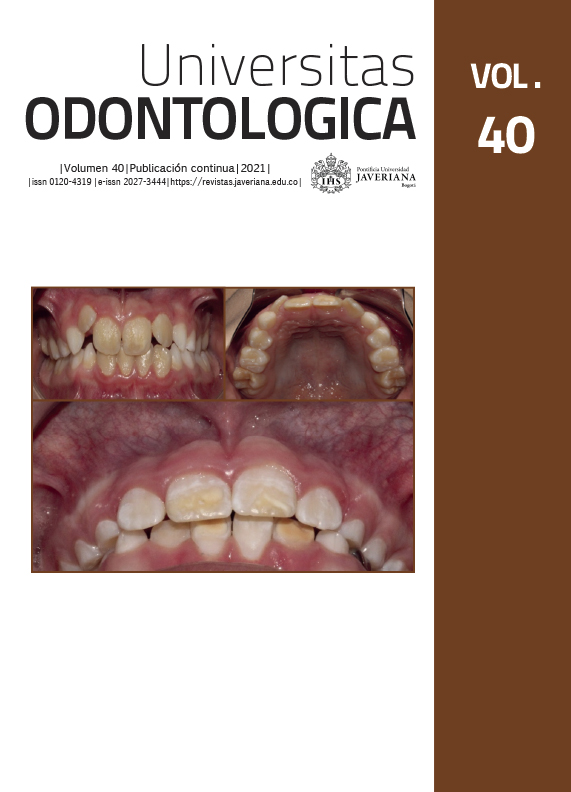Descripción de los procesos de deglución y masticación en adultos con Síndrome de Down: Revisión Exploratoria
##plugins.themes.bootstrap3.article.details##
Antecedentes: El síndrome de Down es la condición genética más prevalente entre las personas con discapacidad. Dado el aumento en la expectativa de vida de estos pacientes, resulta importante mejorar sus condiciones de salud general y oral en la vida adulta. Durante esta etapa del ciclo vital se suman a su condición efectos propios del envejecimiento como pérdida de masa muscular, fuerza y coordinación, lo que impacta también el sistema estomatognático y causa alteraciones en funciones vitales como la deglución y la masticación. Objetivo: Explorar y describir las características de las funciones orofaciales de deglución y masticación en adultos con síndrome de Down. Métodos: Se realizó una búsqueda electrónica en las bases de datos de PubMed, LiLACS y SciELO. Los términos y operadores boleanos utilizados fueron (down syndrome) AND (feeding disorders); (down syndrome) AND ((deglutition disorders) OR (dysphagia)); y (down syndrome) AND ((chewing disorders) OR (masticatory dysfunction)). Resultados: La búsqueda arrojó 82 artículos y, luego de realizar un proceso de selección, se incluyeron 11 artículos con los que se elaboró la revisión. Conclusiones: Los adultos con síndrome de Down presentan rasgos anatómicos y funcionales que afectan los procesos de masticación y deglución. Asimismo, las características de los alimentos también pueden influir en el desempeño de ambas funciones orofaciales. Se sugiere estudiar, en futuras investigaciones, las perspectivas parentales o del cuidador de la deglución y masticación de adultos con síndrome de Down para determinar cómo influyen en el proceso de alimentación e identificar las acciones que ejecutan para facilitar este proceso.
adultos, deglución, discapacidad, funciones orofaciales, masticación, medicina oral, odontología, paciente especial, síndrome de Downadults, chewing, dentistry, disability, Down syndrome, mastication, oral medicine, orofacial functions, special patient, swallowingadultos, deficiência, deglutição, funções orofaciais, mastigação, medicina oral, odontologia, paciente especial, síndrome de Down
2. Nazer H J, Cifuentes O L. Malformaciones congénitas en Chile y Latino América: una visión epidemiológica del ECLAMC del período 1995-2008. Rev Med Chile. 2011 Jan; 139(1): 72-78.
3. Glasson EJ, Dye DE, Bittles AH. The triple challenges associated with age-related comorbidities in Down syndrome. J Intellect Disabil Res. 2014 Apr; 58(4): 393-398. https://dx.doi.org/10.1111/jir.12026
4. Hawkins BA, Eklund SJ, James DR, Foose AK. Adaptive behavior and cognitive function of adults with down syndrome: modeling change with age. Ment Retard. 2003 Feb; 41(1): 7-28. https://dx.doi.org/10.1352/0047-6765(2003)041<0007:ABACFO>2.0.CO;2
5. Head E, Lott IT, Wilcock DM, Lemere CA. Aging in Down Syndrome and the Development of Alzheimer's Disease Neuropathology. Curr Alzheimer Res. 2016; 13(1): 18-29. https://dx.doi.org/10.2174/1567205012666151020114607
6. Lazenby T. The impact of aging on eating, drinking, and swallowing function in people with Down's syndrome. Dysphagia. 2008 Mar; 23(1): 88-97. https://dx.doi.org/10.1007/s00455-007-9096-1
7. Prasher VP, Metseagharun T, Haque S. Weight loss in adults with Down syndrome and with dementia in Alzheimer's disease. Res Dev Disabil. 2004 Jan-Feb;25(1): 1-7. https://dx.doi.org/10.1016/j.ridd.2003.04.005
8. Hennequin M, Faulks D, Veyrune JL, Bourdiol P. Significance of oral health in persons with Down syndrome: a literature review. Dev Med Child Neurol. 1999 Apr; 41(4): 275-283. https://dx.doi.org/10.1017/s0012162299000596
9. Hashimoto M, Igari K, Hanawa S, Ito A, Takahashi A, Ishida N, Koyama S, Ono T, Sasaki K. Tongue pressure during swallowing in adults with down syndrome and its relationship with palatal morphology. Dysphagia. 2014 Aug; 29(4): 509-518. https://dx.doi.org/10.1007/s00455-014-9538-5
10. Smith CH, Teo Y, Simpson S. An observational study of adults with Down syndrome eating independently. Dysphagia. 2014 Feb; 29(1): 52-60. https://dx.doi.org/10.1007/s00455-013-9479-4
11. Zárate N, Mearin F, Hidalgo A, Malagelada JR. Prospective evaluation of esophageal motor dysfunction in Down's syndrome. Am J Gastroenterol. 2001 Jun; 96(6): 1718-1724. https://dx.doi.org/10.1111/j.1572-0241.2001.03864.x
12. Allison PJ, Peyron MA, Faye M, Hennequin M. Video evaluation for mastication validation in persons with Down's syndrome. Dysphagia. 2004 Spring; 19(2): 95-99. https://dx.doi.org/10.1007/s00455-003-0506-8
13. Hennequin M, Mazille MN, Cousson PY, Nicolas E. Increasing the number of inter-arch contacts improves mastication in adults with Down syndrome: a prospective controlled trial. Physiol Behav. 2015 Jun 1; 145: 14-21. https://dx.doi.org/10.1016/j.physbeh.2015.03.034
14. Thacker A, Abdelnoor A, Anderson C, White S, Hollins S. Indicators of choking risk in adults with learning disabilities: a questionnaire survey and interview study. Disabil Rehabil. 2008; 30(15): 1131-1138. https://dx.doi.org/10.1080/09638280701461625
15. Chenbhanich J, Wu A, Phupitakphol T, Atsawarungruangkit A, Treadwell T. Hospitalisation of adults with Down syndrome: lesson from a 10-year experience from a community hospital. J Intellect Disabil Res. 2019 Mar; 63(3): 266-276. https://dx.doi.org/10.1111/jir.12572
16. Bermudez BEBV, de Oliveira CM, de Lima Cat MN, Magdalena NIR, Celli A. Gastrointestinal disorders in Down syndrome. Am J Med Genet A. 2019 Aug; 179(8): 1426-1431. https://dx.doi.org/10.1002/ajmg.a.61258
17. Pinheiro DLDSA, Alves GÂDS, Fausto FMM, Pessoa LSF, Silva LAD, Pereira SMF, Almeida LNA. Effects of electrostimulation associated with masticatory training in individuals with down syndrome. Codas. 2018; 30(3): e20170074. https://dx.doi.org/10.1590/2317-1782/20182017074
18. Hennequin M, Allison PJ, Faulks D, Orliaguet T, Feine J. Chewing indicators between adults with Down syndrome and controls. J Dent Res. 2005 Nov; 84(11): 1057-1061. https://dx.doi.org/10.1177/154405910508401117
19. Mazille MN, Woda A, Nicolas E, Peyron MA, Hennequin M. Effect of occlusal appliance wear on chewing in persons with Down syndrome. Physiol Behav. 2008 Mar 18; 93(4-5): 919-929. https://dx.doi.org/10.1016/j.physbeh.2007.12.010

Esta obra está bajo una licencia internacional Creative Commons Atribución 4.0.


